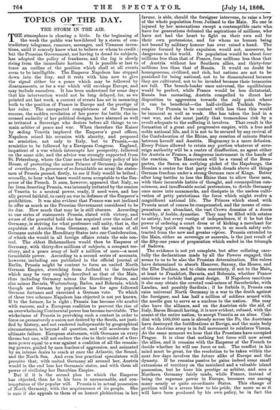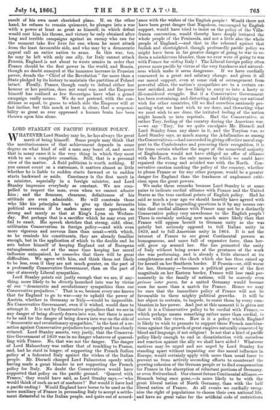TOPICS OF THE DAY.
THE STORM IN THE AIR.
THE atmosphere is clearing a little. In the beginning of the week the public was bewildered by a storm of con- tradictory telegrams, rumours, messages, and Viennese inven- tions, until it scarcely knew what to believe or whom to credit ; but the Prussian Government, not having to dread its subjects, has adopted the policy of frankness, and the fog is slowly rising from the immediate horizon. It is possible at last to trace an outline of the position which shall at all events seem to be intelligible. The Emperor Napoleon has stepped down into the fray, and it rests with him now to give the signal either for a peace which may be followed by disarmaments, or for a war which will envelope Europe, and may include ourselves. It has been understood for some days that his intervention would not be long delayed, for, as we pointed out last week, a current of events has set in menacing both to the position of France in Europe and the prestige of her ruler. The unexpected completeness of the Prussian success, the sudden revelation of her power for battle, the in- creased audacity of her political designs, have alarmed as well as irritated a Sovereign who desires before all things to re- main arbiter of peace and war. When therefore the Kaiser by ceding Venetia implored the Emperor's good offices, Napoleon seized his occasion with alacrity, and proposed an armistice, not only to Italy, but to Prussia,—an armistice to be followed by a European Congress. England, impatient of a war which interrupts her prosperity, followed on the same side, and the advice was strongly supported from St. Petersburg, where the Czar sees the hereditary policy of his House, of protecting the minor Princes of Germany, in danger of overthrow. In presence of so formidable an array the states- men of Prussia paused, firstly, to see if Italy would be bribed ; secondly, to hear what bases would seem acceptable to the Em- peror of the French. It soon, however, appeared that Italy, so far from deserting Prussia, was intensely irritated by the cession of Venetia to a neutral power, ready, if need were, and her ally proved faithful, to carry on war in defiance of the Emperor's prohibition. It was also evident that France was not inclined to offer as much as the Prussian Government considered to be its due. How much that may be is still obscure. According to one series of statements Prussia, elated with victory, and aware of the powerful hold she has acquired over the mind of Germany, is striving for what professors call unity, that is, the expulsion of Austria from Germany, and the union of all Germans outside the Hereditary States into one Confederation, of which she would in all foreign affairs retain the sole con- trol. The eldest Hohenzollern would then be Emperor of Germany, with thirty-five millions of subjects, a compact ter- ritory, and a peace army of half a million of men—a most formidable power. According to a second series of accounts, however, including one published in the official journal of Berlin, Prussia might be content to form an united North German Empire, stretching from Jutland to the frontier which may be very roughly described as that of the Main, thus including Germany minus the Hereditary States, and also minus Bavaria, Wurtemburg, Baden, and Bohemia, which though not German by population has for ages followed German fortunes and exercised a German vote. To which of these two schemes Napoleon has objected is not yet known. If to the former, he is right ; Prussia has become tete exalte'e with success, and a European coalition to prevent the rise of an overwhelming Continental power has become inevitable. The wickedness of Prussia in provoking such a contest in order to force on prematurely a union not desired by the South, not justi- fied by history, and not rendered indispensable by geographical circumstances, is beyond all question, and will accelerate the ultimate failure. European statesmen, with Germans on every throne but one, will not endure the rise in their midst of a Ger- man power equal to a war against a coalition of all the remain- ing powers, guided by men fearless of aggression, and animated by an intense desire to reach at once the Atlantic, the Sound, and the North Sea. And even less practical speculators will perceive that, with united Germany all around her, Austria would in the end lose her Germanic states, and with them all power of civilizing her Danubian Empire.
But if it is the second plan to which the Emperor has objected, then he in his turn is unreasonable, and con- temptuous of the popular will. Prussia is in actual possession of North Germany, with the acquiescence of its people. She is sure if she appeals to them of an honest plebiscitum in her
favour, is able, should the foreigner intervene, to raise a levy of the whole population from Jutland to the Main. No one is. injured by her annexations except" a contemptible caste who. have for generations defeated the aspirations of millions, who have not had the heart to fight on their own soil for their own pretensions, and for whom no human being not bound by military honour has ever raised a hand. The empire formed by their expulsion would not, moreover, be dangerous to the world. Its population would be about four millions less than that of France, four millions less than that of Austria without her Southern allies, and thirty-four millions less than that of Russia. It would no doubt be homogeneous, civilized, and rich, but nations are not to be punished for being national, not to be dismembered because they are cultivated, not to be invaded because their treasuries are full. The breech-loader once universal, the equilibrium would be perfect, while France would be less dictatorial, Russia less menacing, Austria compelled to direct her disposition to aggression towards the only point where it can be beneficial—the half-civilised Turkish Penin- sula. For Prussia to be content with less than this would be immoral as well as weak. She has taken the lead in a vast war, and she must justify that tremendous risk by a result adequate to the suffering it involves. That result is the formation of a great and progressive empire, with a free anci noble national life, and it is not to be secured by any revival of the Confederation of the Rhine, any creation of minute States between herself and Austria. Hegemony is a mere delusion. Every Prince allowed to retain any portion whatever of sove- reign authority will be a centre of disaffection, an agent either for Austria or France, a dangerous instrument in the hands of the reaction. The Hanoverian will be a vassal of the Bona- partes, the Saxon an outlying picket of the Hapsburgs, the Hessian a centre for that party which dreads above all things German freedom under a strong German race of Kings. Better after long battles to lose the Rhine than to allow these men, with their incurable habits of thought, and cosmopolitan con- sciences, and insufferable social pretensions, to divide Germany once more into mummocks, and dissipate in the useless culti- vation of petty patriotisms the force which might evolve a magnificent national life. The Princes which stood with Prussia must of course be compensated, and the means of com- pensation are abundant, the vast Crown domains of a dozen wealthy, if feeble, dynasties. They may be filled with estates to satiety, but every vestige of independence, if it be but the power of ordering a court dress or of kicking a merchant for not being quick enough to uncover, is so much safety sub- tracted from the new and greater regime. Prussia extended to the Main, either as sovereign or suzerain, is the just result of the fifty-one years of preparation which ended in the triumph of Sadowa.
The evidence is not yet complete, but after collating care- fully the declarations made by all the Powers engaged, this seems to us to be also the Prussian determination. Her rulers have determined to absorb Hanover, Saxony, the Hesses, and the Elbe Duchies, and to claim suzerainty, if not to the Main, at least to Frankfort, Bavaria, and Bohemia, whether France sanctions or forbids that great design. If Napoleon sanctions it she may obtain the coveted coal-mines.of Sarrebriicke, with Landau, and possibly Sardinia ; if he forbids it, Prussia can raise universal North Germany in a war to the death against the foreigner, and has half a million of soldiers armed with the needle gun to serve as a nucleus to the nation. She may also have the alliance, and on the Austrian side the aid, of Italy, Baron Ricasoli having, it is now evident, refused, with the assent of the entire nation, to accept Venetia as an alms. Cial- dini with 100,000 men is already across the Po, the Austrians have destroyed the fortifications at Rovigo, and the main body of the Austrian army is in full movement to reinforce Vienna. At the same moment we hear that the Prussians have occupied Prague. It is clear that nothing but force will now arrest the allies, and it remains with the Emperor of the French to decide whether he will use force or not. The conflict in his mind must be great, for the resolution to be taken within the next few days involves the future alike of Europe and the dynasty. If he remains passive he gains indeed some small extensions of territory on the mainland and a valuable island possession, but he loses his prestige as arbiter, and sees a Northern Germany fairly made, while France, instead of being the supreme power in Europe, becomes one among many nearly or quite co-ordinate States. This change of position will be a severe blow to his pride, the more so as it will have been produced by his own policy, be in fact the result of his own most cherished plans. If, on the other hand, he refuses to remain quiescent, he plunges into a war with a power at least as great as himself, in which defeat would cost him his throne,, and victory be only obtained after long and terrible campaigns against an enemy who can for 'the moment take five lives for one, whom he must attack . from the least favourable side, and who may by a democratic appeal call an entire nation to arms. In this war, too, lie may be left with only one ally, for Italy cannot attack Prussia, England is not about to waste armies in order that France should be the first power in the world, and Russia, though no doubt annoyed at the immense increase in Prussian power, dreads the "Chief of the Revolution" far more than a State pledged by its history to maintain the partition of Poland intact. Finally, France, though ready to defend either her honour or her position, does not want war, and the Emperor himself has realized as few Sovereigns have what a grand -campaign really means. We do not pretend, with the con- ditions so equal, to guess to which side the Emperor will at last incline, but this much at least is clear, that a responsi- bility as great as ever oppressed a human brain has been thrown upon him alone.































 Previous page
Previous page